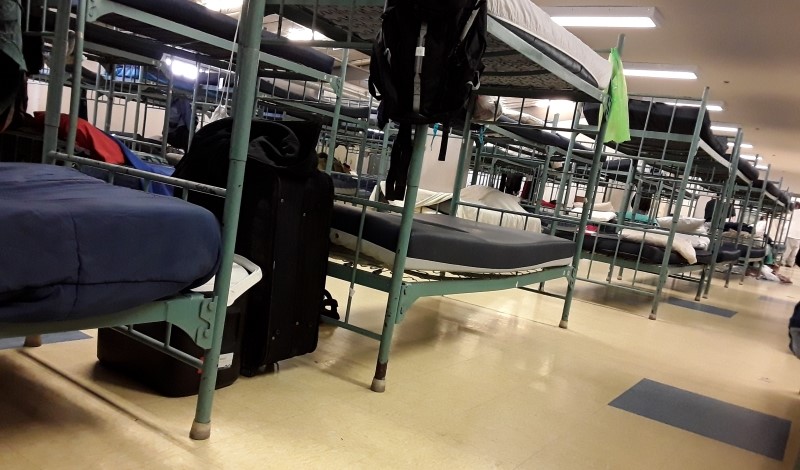
Scholar argues that unhoused individuals should have the right to decide whether to use government shelter.
On any given night in 2023, 652,100 Americans experienced homelessness—a 12 percent increase from 2020.
This surge, argues law professor Ben A. McJunkin of the Arizona State University Sandra Day O’Connor College of Law in a recent article, has prompted a proliferation of laws that, by criminalizing sitting, lying, sleeping, or loitering in public places, functionally criminalize homelessness.
In response to the criminalization of homelessness, lawyers and advocates for the unhoused have called on states and the courts to enshrine a right to shelter and require the government to provide shelter for the unhoused, McJunkin observed. But according to McJunkin, government-funded shelters will not solve the homelessness crisis. In fact, efforts to expand shelter services may exacerbate the plight of the unhoused by providing justification for the criminalization of those who elect not to use government-provided shelter, McJunkin claims.
With that concern in mind, McJunkin proposes that advocates for the unhoused instead push for recognition of a right to shelter oneself without governmental interference—a negative right to shelter that would decriminalize self-sheltering activities. McJunkin claims that the recognition of such a right is necessary to protect the unhoused from the onslaught of new laws that criminalize urban camping, which refers to sleeping in public places such as sidewalks or parks.
To start, McJunkin explains that a positive right is a right to something and a negative right is the right to be free from something. McJunkin notes that the right to shelter has traditionally been framed as a positive right—one that requires affirmative action to fulfill a specific entitlement. According to McJunkin, the right to shelter is traditionally understood as a positive right because it requires that the government provide unhoused individuals with a temporary shelter bed.
McJunkin illustrates that this conceptualization of the right to shelter has not resulted in a meaningful increase in government-provided shelter. For example, a Massachusetts law requires all municipalities to provide temporary shelter to all eligible families. Nevertheless, the agency responsible for providing shelter denies about 40 percent of applications. According to McJunkin, the agency does so because the state has only 3,000 available shelter beds, and because the law imposes strict and unrealistic eligibility requirements.
But even more troubling, McJunkin contends, is the fact that laws such as Massachusetts’ have been used to justify the criminalization of urban camping. McJunkin notes that this is possible because of a trend among courts throughout the country of dismissing Eighth Amendment challenges to ordinances banning urban camping whenever shelter beds were available.
McJunkin examines Pottinger v. City of Miami, an early and prominent Eighth Amendment challenge to an urban camping ordinance. In 1992, the Pottinger plaintiffs challenged Miami’s systematic removal of unhoused individuals from tourist and business districts. After finding that Miami had nearly ten times as many unhoused individuals as shelter beds, the court held that the challenged ordinances punished the plaintiffs “for something for which they may not be convicted under the Eighth Amendment—sleeping, eating, and other innocent conduct.”
McJunkin points to two recent decisions by the U.S. Court of Appeals for the Ninth Circuit that have “centered the provision of shelter beds in the legal debates over the criminalization of homelessness.” Both decisions interpret the Eighth Amendment to prohibit enforcing urban camping prohibitions unless a shelter bed is reasonably available. The consequence of this interpretation is that when a bed is available, urban camping constitutes a morally culpable “choice” made by the unhoused, McJunkin determined.
The Eighth Amendment caselaw has “simply given the criminalization of homelessness a makeover,” McJunkin claims, drawing upon the work of law professor Sara Rankin. McJunkin endorses Rankin’s “transcarceration” framework, which refers to the process by which municipalities, by forcing the unhoused into shelters, achieve the same effect of criminalization—a reduction of visible homelessness.
With the “transcarceration” framework in mind, McJunkin proposes a negative right to shelter that protects the right to undertake self-sheltering activities, such as the use of blankets and bedding or the erection of temporary encampments in public spaces. McJunkin situates the negative right to shelter as an outgrowth of substantive due process, which he says preserves the “capacity for self-determination, particularly with respect to bodily autonomy and interpersonal relationships.”
McJunkin urges lawyers and advocates for the unhoused to argue that the unhoused have a negative, substantive due process right to decide for themselves how and where to shelter. He explains that recognition of a negative right to shelter would prevent municipalities from adopting blanket bans on urban camping that criminalize those who engage in self-shelter.
McJunkin references the 2003 U.S. Supreme Court decision in Lawrence v. Texas, which struck down state laws criminalizing same-sex intimacy and established substantive due process protection for consensual sexual conduct. Its holding, McJunkin argues, reaches beyond the narrow context of sexual intimacy and provides broad substantive due process protection for the “capacity to direct the course of one’s life.” Therefore, because laws criminalizing urban camping infringe upon unhoused individuals’ interest in bodily autonomy, they violate substantive due process as articulated by Lawrence v. Texas, McJunkin contends.
Although Eighth Amendment cases such as Pottinger may have seemed at the time like wins for advocates for the unhoused, the positive right to shelter has fallen short of protecting the substantive due process rights of the unhoused, McJunkin explains. Therefore, according to McJunkin, advocates should instead argue that the unhoused have a negative right to self-shelter and that urban camping ordinances violate substantive due process. As McJunkin concludes, recognizing a negative right to shelter could protect the dignity of the unhoused and ensure that the unhoused—and not the government—determine for themselves “how best to live life in the face of overwhelming constraints.”



